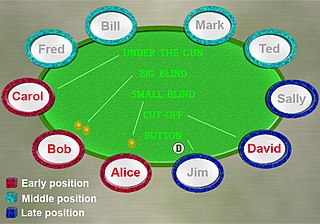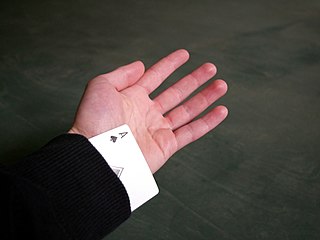
Poker is any of a number of card games in which players wager over which hand is best according to that specific game's rules in ways similar to these rankings. Often using a standard deck, poker games vary in deck configuration, the number of cards in play, the number dealt face up or face down, and the number shared by all players, but all have rules that involve one or more rounds of betting.
In poker, the strength of a hand is often called its value; however, in the context of poker strategy the term is more often used to describe a betting tactic, a bet for value. This bet is intended to increase the size of the pot, by inducing opponents to call. A bet for value is in contrast to a bluff or a protection bet.
A poker player is drawing if they have a hand that is incomplete and needs further cards to become valuable. The hand itself is called a draw or drawing hand. For example, in seven-card stud, if four of a player's first five cards are all spades, but the hand is otherwise weak, they are drawing to a flush. In contrast, a made hand already has value and does not necessarily need to draw to win. A made starting hand with no help can lose to an inferior starting hand with a favorable draw. If an opponent has a made hand that will beat the player's draw, then the player is drawing dead; even if they make their desired hand, they will lose. Not only draws benefit from additional cards; many made hands can be improved by catching an out — and may have to in order to win.
In poker, pot odds are the ratio of the current size of the pot to the cost of a contemplated call. Pot odds are often compared to the probability of winning a hand with a future card in order to estimate the call's expected value.

In the card game of poker, a bluff is a bet or raise made with a hand which is not thought to be the best hand. To bluff is to make such a bet. The objective of a bluff is to induce a fold by at least one opponent who holds a better hand. The size and frequency of a bluff determines its profitability to the bluffer. By extension, the phrase "calling somebody's bluff" is often used outside the context of poker to describe situations where one person demands that another proves a claim, or proves that they are not being deceptive.

In the game of poker, the play largely centers on the act of betting, and as such, a protocol has been developed to speed up play, lessen confusion, and increase security while playing. Different games are played using different types of bets, and small variations in etiquette exist between cardrooms, but for the most part the following rules and protocol are observed by the majority of poker players.
Seven-card stud, also known as Seven-Toed Pete or Down-The-River is a variant of stud poker. Until the recent increase in popularity of Texas hold 'em, seven-card stud was the most widely played poker variant in home games across the United States, and in casinos in the eastern part of the country. Two to eight players is common, though eight may require special rules for the last cards dealt if no players fold. With experienced players who fold often, even playing with nine players is possible.

Texas hold 'em is one of the most popular variants of the card game of poker. Two cards, known as hole cards, are dealt face down to each player, and then five community cards are dealt face up in three stages. The stages consist of a series of three cards, later an additional single card, and a final card. Each player seeks the best five card poker hand from any combination of the seven cards; the five community cards and their two hole cards. Players have betting options to check, call, raise, or fold. Rounds of betting take place before the flop is dealt and after each subsequent deal. The player who has the best hand and has not folded by the end of all betting rounds wins all of the money bet for the hand, known as the pot. In certain situations, a "split-pot" or "tie" can occur when two players have hands of equivalent value. This is also called a "chop-pot".
Slow playing is a deceptive play in poker where a player bets weakly or passively with a strong holding. It is the opposite of fast playing. A flat call can be a form of slow playing. The objective of slow playing is to lure opponents into a pot who might fold to a raise, or to cause them to bet more strongly than they would if the player had played aggressively. Slow playing sacrifices protection against hands that may improve and risks losing the pot-building value of a bet if the opponent also checks.

Cheating in poker is any behavior outside the rules that is intended to give an unfair advantage to one or more players.
The fundamental theorem of poker is a principle first articulated by David Sklansky that he believes expresses the essential nature of poker as a game of decision-making in the face of incomplete information.
Every time you play a hand differently from the way you would have played it if you could see all your opponents' cards, they gain; and every time you play your hand the same way you would have played it if you could see all their cards, they lose. Conversely, every time opponents play their hands differently from the way they would have if they could see all your cards, you gain; and every time they play their hands the same way they would have played if they could see all your cards, you lose.
Vigorish is the fee charged by a bookmaker for accepting a gambler's wager. In American English it can also refer to the interest owed a loanshark in consideration for credit. The term came to English usage via Yiddish slang, which was itself a loanword from Ukrainian or Russian.
Suited connectors is a poker term referring to pocket cards that are suited and consecutive, for example Q♥ J♥. These hands are considered stronger than average because they have the highest potential to form straights and flushes when combined with the community cards.
Razz is a form of stud poker that is normally played for ace-to-five low. It is one of the oldest forms of poker, and has been played since the start of the 20th Century. It emerged around the time people started using the 52-card deck instead of 20 for poker.
Morton's theorem is a poker principle articulated by Andy Morton in a Usenet poker newsgroup. It states that in multi-way pots, a player's expectation may be maximized by an opponent making a correct decision.

Badugi is a draw poker variant similar to triple draw, with hand-values similar to lowball. The betting structure and overall play of the game is identical to a standard poker game using blinds, but, unlike traditional poker which involves a minimum of five cards, players' hands contain only four cards at any one time. During each of three drawing rounds, players can trade zero to four cards from their hands for new ones from the deck, in an attempt to form the best badugi hand and win the pot. Badugi is an often gambling game, with the object being to win money in the form of pots. The winner of the pot is the person with the best badugi hand at the conclusion of play. Badugi is played in cardrooms around the world, as well as online, in rooms such as PokerStars. Although it doesn't have its own tournament per se at the WSOP, it is featured in the Dealers Choice events as well as in the Triple Draw Mix.
Negative freeroll occurs in poker when a player places an all-in wager on a hand that can only either tie or lose. A negative freeroll is relatively common in low stakes amateur play, but in higher stakes play, it is considered a serious blunder to allow a negative freeroll on the final round of betting due to the amount of risk involved.
The following is a glossary of poker terms used in the card game of poker. It supplements the glossary of card game terms. Besides the terms listed here, there are thousands of common and uncommon poker slang terms. This is not intended to be a formal dictionary; precise usage details and multiple closely related senses are omitted here in favor of concise treatment of the basics.
Poker is a popular card game that combines elements of chance and strategy. There are various styles of poker, all of which share an objective of presenting the least probable or highest-scoring hand. A poker hand is usually a configuration of five cards depending on the variant, either held entirely by a player or drawn partly from a number of shared, community cards. Players bet on their hands in a number of rounds as cards are drawn, employing various mathematical and intuitive strategies in an attempt to better opponents.
Kiu kiu or qiu qiu is a game of dominoes popular in Indonesia related to pai gow. It may also be referred to as 99 domino poker which can be played on android device downloaded from Google_Play.







